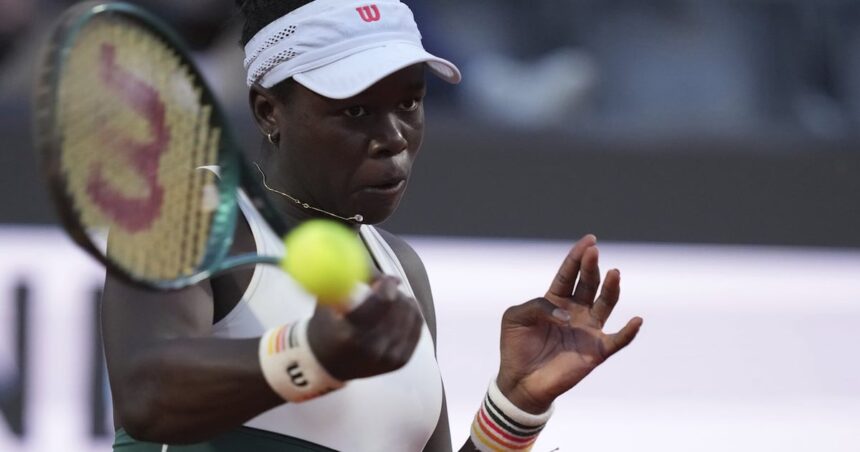Victoria Mboko’s remarkable journey from Toronto’s community courts to the prestigious clay of Roland-Garros represents a watershed moment for Canadian tennis. The 17-year-old phenom secured her spot in the French Open main draw yesterday, becoming one of the youngest Canadians ever to qualify for this Grand Slam tournament.
“This feels absolutely surreal,” Mboko told me during our phone conversation shortly after her decisive qualification match. “I’ve dreamed about playing in Grand Slams since I was a little girl hitting balls against my garage door in Toronto.”
Her qualification path wasn’t easy. Mboko displayed remarkable mental fortitude, winning three consecutive qualifying matches against higher-ranked opponents. In her final qualifying match, she overcame early nerves to defeat veteran player Magdalena Fręch in a tense three-setter that showcased her powerful groundstrokes and tactical maturity beyond her years.
Born to Congolese parents who immigrated to Canada seeking better opportunities, Mboko’s tennis journey began at Toronto’s public courts in the Jane and Finch neighborhood. Local coach Denise Starling spotted her natural talent when Victoria was just seven years old.
“Victoria always had that special quality—extraordinary focus combined with natural athletic ability,” Starling explained. “But what truly sets her apart is her work ethic. Even as a child, she would stay hours after regular practice while other kids were heading home.”
Tennis Canada recognized her potential early, bringing her into their development program when she was 12. The organization has invested significantly in nurturing homegrown talent following the breakthrough success of Bianca Andreescu, Denis Shapovalov, and Felix Auger-Aliassime.
Statistics support the growing strength of Canadian tennis. According to Tennis Canada, participation in youth tennis programs has increased 43% since 2019, with Toronto seeing the highest growth nationally. The city now boasts over 25 development centers focusing on cultivating professional talent.
Mboko’s game has evolved dramatically over the past year. Working with renowned coach Guillaume Marx, she’s added more spin to her forehand and improved her movement on clay—traditionally a challenging surface for North American players raised on hardcourts.
“Victoria has that rare combination of power and touch,” Marx noted. “She’s not just hitting the ball hard; she’s developing the tactical awareness to construct points intelligently. That’s crucial for success at Roland-Garros.”
The French Open represents a significant milestone, but Mboko’s support team is careful to manage expectations. Dr. Jessica Williams, sports psychologist with Canada’s Olympic program, has been working closely with the young star.
“For young athletes experiencing their first Grand Slam, we focus on the process rather than results,” Williams said. “Victoria’s approach is refreshingly mature—she’s excited but grounded, understanding this is just one step in a long career journey.”
The financial challenges of professional tennis remain substantial. According to Ontario Tennis Association figures, developing a junior player to professional level typically costs between $30,000-50,000 annually. While Tennis Canada provides significant support, Mboko’s family has made considerable sacrifices to supplement her development.
Her father, Emmanuel Mboko, worked double shifts as a security guard to help fund early tournament travel. “We believed in Victoria’s dream,” he said. “Seeing her qualify for Roland-Garros makes every sacrifice worthwhile.”
Local businesses have also rallied behind her. Toronto-based sportswear company Athletica recently signed Mboko to her first endorsement deal, providing equipment and competition attire. “Supporting homegrown talent isn’t just good business—it’s about building community through sport,” explained Athletica CEO Jamal Thompson.
The French Open main draw presents a daunting challenge. Mboko could potentially face established stars like Iga Świątek or Aryna Sabalenka in early rounds. However, the experience alone provides invaluable learning opportunities regardless of results.
“I’m not putting pressure on myself to win the tournament,” Mboko said with a laugh. “I want to compete hard, learn from every point, and represent Toronto and Canada with pride.”
Her qualification has sparked enthusiasm throughout Toronto’s tennis community. Weekend court bookings at public facilities have jumped 28% according to City of Toronto Parks data, with particular increases in neighborhoods with diverse populations.
The timing couldn’t be better for Canadian tennis. With established stars Andreescu and Shapovalov facing injury challenges, Mboko represents the next wave of Canadian talent. Tennis Canada High Performance Director Louis Borfiga sees her potential clearly: “Victoria has all the tools to be a top-20 player, possibly higher. Her qualification at such a young age confirms what we’ve seen in her development.”
For the Toronto teenager, this achievement represents both personal triumph and cultural significance. “I hope kids watching from neighborhoods like mine see that tennis isn’t just for certain communities,” Mboko reflected. “With hard work and support, dreams like this are possible for anyone.”
The French Open main draw begins this Sunday, with Mboko’s first-round opponent to be determined at tomorrow’s draw ceremony.
Walking through Toronto’s Pearson Airport for her Paris flight, Mboko stopped to sign autographs for young fans—a new experience that signals her arrival on tennis’s biggest stage. “Five years ago, I was the kid asking for autographs,” she smiled. “Life changes quickly in this sport.”
Indeed it does, Victoria. Indeed it does.







